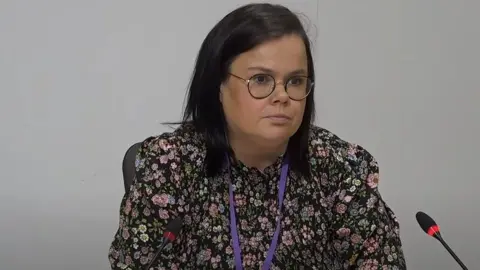'I missed Mum's death by seconds because of care home Covid rules'
 Scottish Covid-19 Inquiry
Scottish Covid-19 InquiryA woman missed being with her mother when she died in a care home by seconds because of Covid restrictions during the pandemic, an inquiry has heard.
Natasha Hamilton had to get the results of a Covid test and then "wait her turn" to visit her mother.
The Scottish Covid Inquiry heard she was too late to say a final farewell.
Her mother Anne Duke, who had dementia, died on 13 November 2021 aged 63. Her cause of death was given as Alzheimer's and pneumonia.
She was 56 when she was diagnosed with Alzheimer's in 2014 and was admitted to a care home in 2018.
Ms Hamilton told the inquiry that dementia "destroyed" her mother, but she visited the care home regularly before the pandemic and "cherished" the moments she spent with her.
But she said she did not have a chance to say a final goodbye to her mother as she was "waiting her turn" while her father and sister were in the room.
Her voice choking with emotion, she said: "I was up in my in-laws' house because I wasn't able to enter the care home until a certain point.
"I had to take a PCR Covid test. I got to my mum's room, I opened the door and my dad was frantic and I looked at my sister and my sister just nodded at me.
"I'd missed being with my mum by seconds because we had to stagger who was coming into the care home."

Ms Hamilton is part of a campaign looking to ensure people living in care homes have the legal right to visits from a loved one even when restrictions are in place.
The group want the proposed "Anne's law" - named after Anne Duke - to be passed in full and put into national standards.
The inquiry also heard from Ms Hamilton's father Campbell Duke, who said it felt like care home residents were kept "under lock and key" during the pandemic.
He said: "My wife was one of the few sectors of society which literally had somebody standing at their front door with the keys saying 'You shall not pass'."
Stuart Gale KC then read from a written statement Mr Duke gave to the inquiry, in which he said: "The government must never again be allowed to imprison our most frail and vulnerable in such an inhumane way. It has been despicable, heartless and relentless."
'Not private at all'
Mr Duke also spoke of the unsatisfactory nature of "garden visits" which were allowed from August 2020.
He said: "Our garden visits were taking place in a car park with potholes in it, 15 feet away from the pavement where people were passing by, and my wife was brought out to be paraded, sat two to three metres away from me with a member of staff sitting watching, listening to everything.
"It was cold, a Scottish summer. People were walking by 15 feet away, they could see us, they could hear us, they knew what was going on. It was not private at all."
The inquiry later heard evidence from Alison Leitch of the group Care Home Relatives Scotland (CHRS), who told the panel she was prevented from seeing her mother, Kathleen, at the last minute on Christmas Day 2022.
The care home had previously agreed to allow residents to spend time with their families.
However, Ms Leitch said she was told at about 20:00 on Christmas Eve that she would not be allowed to see her mother due to a flu outbreak.
She told the panel the nurse she spoke to had "never heard of a care home being closed for flu" in her 30 years of nursing.
Decision 'unforgiveable'
Ms Leitch added: "Still, words fail me about this. After everything that we have been through, somebody made the decision to ruin Christmas again.
"I saw families shouting through windows on Christmas Day last year. The place was so empty."
She went on to say the decision was "unforgiveable".
The aim of Scotland's Covid public inquiry is to establish the facts of what happened during the country's response to the pandemic and work out what lessons can be learned for future public health emergencies.
The inquiry, which continues in Edinburgh, has been commissioned by the Scottish government.
But it operates independently under chairman Lord Brailsford, who can demand evidence and compel witnesses to attend.
